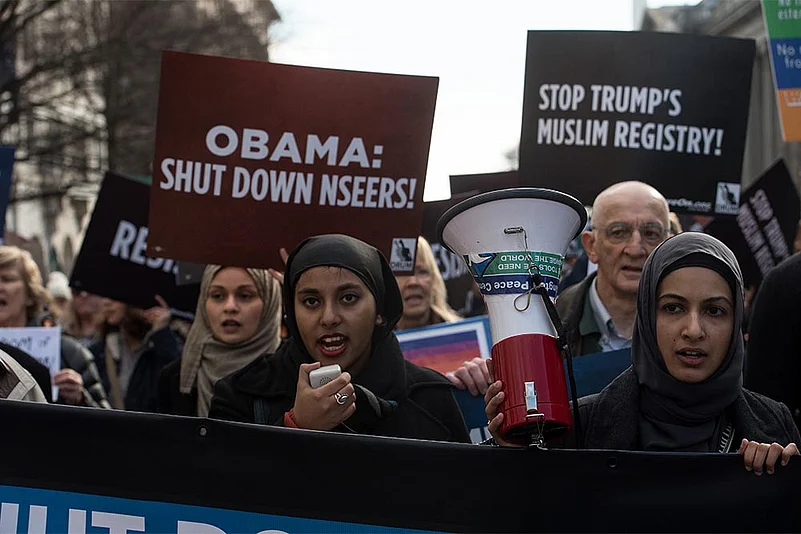“All happy families are alike; each unhappy family is unhappy in its own way.” Leo Tolstoy was referring to the tumult in Prince Stiva Oblonsky’s household in this celebrated opening line of Anna Karenina (1877), but he could just as well have been writing about people of colour in the US circa 2017. Be it Hispanics, Blacks or Muslims—all minorities are feeling deeply apprehensive at the cusp of Donald Trump’s presidency. Each of them, however, has its own unique fears about the next four to eight years.
For Thalia Longoria, the concern is personal—and pressing. The 32-year-old high school teacher had surgery on Monday to take out her gall bladder. “They are planning to repeal Obamacare,” she said about outgoing President Barack Obama’s health insurance plan, which Trump and his Republican Party have unflinchingly opposed for years. “Right now I have insurance provided by my employer, which will pay for my surgery. But it scares me what’s going to happen if things change dramatically with Trump’s administration.”
Anxiety about medical bills, however, doesn’t compare with Longoria’s fear of losing touch with her family across the Mexican border—a fear she shares with millions of Hispanic-origin Americans. Longoria lives with her aunt in the dusty southern town of El Paso, Texas. Her parents came from Mexico and she still has “uncles and grandmothers” there. A Trump plan to build a wall along the border—to keep out so-called “undocumented immigrants”, or people living in the US without the right papers—could make it harder for them to stay connected.
The border wall was one of the many xenophobic and racist promises that candidate Trump, a business tycoon and reality TV star, made en route to a shock victory in the November 8 presidential election, in which he edged out Democratic nominee Hillary Clinton. His most popular campaign slogan was ‘Make America Great Again’ by getting rid of non-whites in particular. He is due to take over from Obama as the 45th US president in an inauguration ceremony on January 20.
Another promise he made during his campaign was mass deportation of undocumented immigrants. There are more than 11 million such people in the US—half of them from Mexico and another 20 per cent from central and South America. Many have close relatives—wives, sons and daughters—who live, study and work here legally. Mass deportations, even more than the border wall, would tear families apart. Unsurprisingly, only 28 per cent of Hispanic Americans supported him, compared with 66 per cent who voted for Clinton.
“I am just waiting and watching to see if the promises he made on the campaign trail end up being his actual policy priorities and if he can get Congress and the American public to back him,” says Hoda Hawa, director of policy and advocacy at the Muslim Public Affairs Council, a Washington DC-based advocacy group. “I am holding my breath and waiting to see how he will lead the country in the first 100 days, because I think that will set the tone for the rest of the administration.”
Trump has accused Muslims en masse of terrorism and made several threats against the community, ranging from a blanket ban on Muslims entering the US to a registry keeping track of community members. He has repeated some of these threats since his election. Whether he manages to impose such restrictions or not, Hawa says the rhetoric itself has been damaging.
“The rhetoric has translated into direct action over the last 16 months. There has been an uptick in hate crimes against Muslim Americans and those perceived to be Muslim Americans. Data from all over the country shows that when Trump or one of his surrogates said something against Muslims, they experienced a backlash. If it does continue, we are going to see some hard times ahead,” she adds.
Trump’s presidency, Hawa fears, will also mean reduced access to the federal government for Muslims. The Obama administration was directly engaged with the community and Muslim leaders had access to the highest echelons of power, including the president himself. It allowed them a ‘seat on the table’ and a say in policies that affected the community. “I expect access to reduce under Trump,” Hawa says. “A lot of the engagement will be shifted from the federal to the Congressional, state and local levels.”
Black Americans may not have been directly threatened by Trump, but they are just as distraught to see a white supremacist replace Obama, the country’s first Black president. Only eight per cent Blacks voted for the Republican leader. Several Black people were also at the forefront of ‘Not My President’ protests that broke out nationwide following Trump’s election.
But Alfred Martin, assistant professor of media studies at the University of Colorado-Denver and a Black, says reducing the woes of the Black community—or even of other communities of colour—to the ‘Trump moment’ was grossly misleading. “In the last three years or so, there have been open attacks on Black folks anyway. If you look at the number of Black folks who have died at the hands of police officers, that is already happening,” he says.
Martin sees the “pivot to the ideology of post-race” following Obama’s election in 2008 as a precursor to the open racial violence of recent years. The arrival of the first Black president in the White House caused many to think that racism was a thing of the past. It led, among other things, to the repeal of provisions that had been placed decades ago to protect minorities and level the racial playing field.
“As a result, we had the disassembling of key portions of the Voting Rights Act, of the notion that we live in an unequal world,” Martin says. In 2013, the US Supreme Court struck down a key portion of the 1965 Voting Rights Act that had obliged certain parts of the country to have changes in their voting laws cleared by the federal government or a federal court—to ensure that they did not exclude minorities from the democratic process. But the court, while repealing this provision, noted that “things have changed dramatically” in terms of race relations since the original act was passed.
Despite its image, the Obama presidency itself was hardly the most minority-friendly in history. Nearly 2.5 million people were deported between 2009 and 2015—more than under any other previous president. And although Obama attempted to engage with Muslims, he also put Muslims under surveillance, continued wars against Muslim-majority nations launched under his predecessor George W. Bush and initiated some of his own—deepening the hostility experienced by Muslim Americans in the process.
Martin says that at different times throughout American history, different communities of colour have faced the brunt of white bigotry. “Native Americans had their turn. Latinos had their turn. Muslim Americans had their turn. And of course Black folks had their turn,” he says. “What is different about this time is that it’s kind of an amalgamation of racism that has permeated our country since almost its founding. Now, all the groups are having their turn together.”
Thus, while each unhappy minority may be unhappy in its own way, sharing their unhappiness—and figuring out how to deal with it together—might be the best way forward. “There will need to be a coming together where everybody says listen, this is our broad-based agenda, what are we going to do about it,” says Martin.
Hawa, of the Muslim Public Affairs Council, agrees. Challenging Trump, she says, would require the “combination of a very active and vibrant civil society pushing back against his policy proposals, working with members of Congress to block his problematic policies—especially when it comes to vulnerable minorities and people of colour—and working with our allies in specific faith communities to ensure that if these proposals go from rhetoric to action, we have allies willing to support our communities.”
By Saif Shahin in Ohio

























